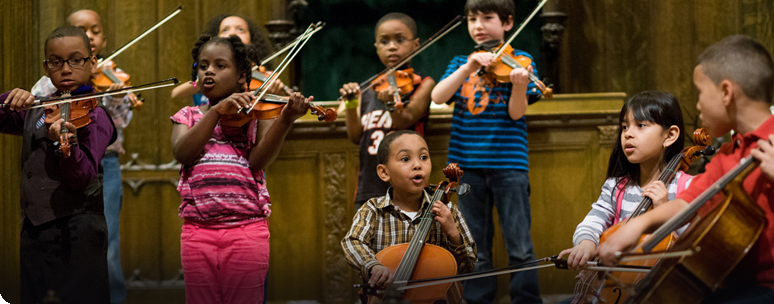We are invited into a conversation in the dark. Velvet curtains are rich, rippling in midnight blue light. We're sitting together in the hall, nearly six hundred of us. It's not a dream, although parts of the concert will unfold with the unexpectedness of a dream, will provoke emotion and longing. There is a half moon of musicians behind the four members of Kronos Quartet – The CMW Players, Fellows and students filling out the semi-circle, waiting to perform Kareem Roustom's "A Voice Exclaiming," a commission by Community MusicWorks and FirstWorks, three years in the making.
From David Harrington's first bow stroke, we know that Roustom will get the Kronos treatment: Urgency. Urgency of necessary response, of risk, of questioning the world. And these questions will reverberate to the audience in the way that great art makes us question ourselves and our basic preconceptions.
From the beginning of the first movement, I wonder: What am I hearing? The familiar opening of a Western concert piece? But I'm also hearing Arabic rhythms that recall traditional classic orchestras, simple songs. Arabic basics that might be heard in a taxi or cafe in Egypt, in Tunisia, in Syria.
As in other Kronos pieces, I grasp onto a rhythm. But then, the rhythm is broken off. It is repeated when I don't expect it. The cells of the song keep bouncing around. Where is home? Do we know? The classical Arabic phrase that was started and interrupted reappears on the other side of the stage, played by CMW students suddenly under a spotlight. The spotlight had been on them, only we weren't looking at them. Suddenly we're looking at the kids. A cellist, a violinist, these young students are adding their voices to the music along with these seasoned and charismatic professionals.
We smile. We are taken in. There is a drama. Where will it surface next, in what form? Shapeshifting is a way of not being fixed on one immovable idea.
The melody played by Hank Dutt's viola in the second movement is unbearably moving. It is from the Easter ceremony of the Eastern Orthodox Church. It is langourous, reminding us that the human voice with its slurs and scales is the most powerful voice of all. But it reminds me of a lament I heard half an hour before, in the cello of Sunny Yang playing "Sim Sholom." It was a Jewish lament sung on the most solemn day of the Jewish calendar, Yom Kippur. Christian Orthodox, Jews. Cries from the heart sound remarkably similar!
Following the spotlight, I look at David Harrington. Judging from his body language, he's crossed borders too. At the beginning of the concert, he was a tight ball of rock-star anxiety ("Aheym"). He was pure energy that left his bow in tatters ("…hold me, neighbor, in this storm…"). He is now sensual, making figure eights with his neck, his eyes closed. His violin's voicing is ethereal, just a whisper.
Elegy, the tone of the piece has been set. We have entered deep into the shadows of sorrow for the deaths of victims in Syria, in war and abuse. Or it has entered us. As the orchestra moves into the celebration of the final movement, Dabkè, (Line Dance), elegy is not forgotten but the pace picks up. The dance is delicate, and the voice of student players is heard.
Suddenly, Harrington raises his hand in invitation – cellists trot out to the front of the stage and begin to play! They are eye-level with us, playing a piece of a composer sitting in the audience. Harrington makes another gesture: Let there be more! Kids are hovering at the top of the stairs like cherubim, a heavenly choir. As if descending from clouds, they slowly go from darkness into light. The drama, the surprise of the young generation stirs a range of competing emotions. From delight to sorrow in the presence of beauty to hope, I asked myself: Where am I? Church? Art space? Western concert hall? That was such a wonderful moment of disorientation. It was full of questioning. But even more important than the questioning was the mysterious dissolving of questioning. The questions all folded together, contradictions melted, fusing into the moment. The moment lingered, the moment was IT.
-Jill Pearlman
Providence-based writer Jill Pearlman worked in music journalism in New York for over a decade. She's currently tapping some of her experiences for her novel, Clio's Mobile Home.
